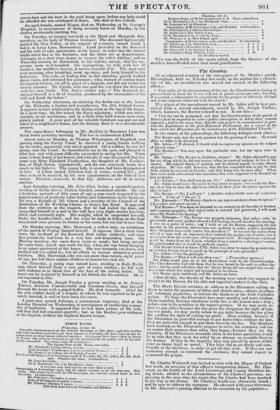bz eatintrn. At an adjourned meeting of the rate-payers of
St. Martin's parish, Birmingham, held on Tuesday last week, on the motion for a church- rate of ad., an amendment was moved and carried, to the following effect- " That under all the circumstances of the case, the Churchwardens having at present funds in hand, the Vestry will not at present grant any rate ; but that, if requested, a subscription be entered into for the purpose of defraying all legal and proper expenses connected with the church."
The object of the amendment moved by Mr. Sabin will be best per- ceived from a second amendment, moved by Mr. Joseph Parkes ; which, however, the Rector refused to put. It run thus-
" That the rate be postponed, and that the Churchwardens of the parish of Birmingham be requested to raise a public subscription to defray their current expenses' and in the man time, that the rate-payers be recommended to peti- tion the legislature in the first Reformed Parliament, for a repeal of the laws which tar Dissenters for the maintenance of the Established Church." In the course of the proceedings, the following dialogue took place— The Rector said, that the only question was the granting of erste. He would allow no other to be discussed.
Mr. Sabin—" If allowed, I should wish to express my opinion on the subject of church. rates." The Rector—" You may upon this particular rate, but not upon rates in general."
Mr. Sabin—" The Rector is, doubtless correct." Mr. Sabin objected to pay for any thing which he did not receive, when he received nothing in lieu of his money. He enjoyed liberty of opinion, and he claimed equally to enjoy liberty of pocket. He was told, however, that the law compelled him to pay forthat from which lie received no benefit; and that being law, he must obey. When laws were made and carried into execution, they were supposed to be founded on
just principles.
Rector—" You shall not go on, Sir." (Immense uproar.) Alr. Sabin would wave the point he was about to argue' but would the Rec- tor allow him to state the objections which he drew from Scriptui c against the
church-rate?
The Rector—" No, I will not." (Another indescribable scene of confusion ensued. Cries of " Go on.") N r. Edmonds—" The Rector objects to any argument drawn from Scripture." - (Lauyhter and great uproar.)
The Rector-,." You seem so disposed to act contrary to all the rules of decency
and c thtnaitg.un,lt.ss order is restored and preserved, I will most
assuredly propriety, meeting.
Air. Ethnoads—" The Rector very properly intimates, that unless orrier be preserved, and every speaker allowed a full hearing, he will dissolve the meeting. I she on a point of order; argil I wish to ask the Rector, supposing the last speaker in his previous observations was perfectly in order, would a quotation frui:: Scripture necessarily render him disorderly?" It was not the source from wl.:,11 a man took an argument that rendered the speaker out of order, but it n:ut arise from the irrelevancy of the argument itself. If a legitimate al gument Ct all be drawn from the Koran, whether from a moral or a theological source, he apprehended that it would be perfectly regular. The Rector wished to know if Mr. Sabin was about to argue the present rate, or whether he was about to speak on the principle of rates generally? Mr. Sabin—" On the principle." The Rector—" Then I will not allow you." ( Tremendous uproar.) Mr. Sabin would pass on to the observations made by the Churchwarden. The Churchwarden had told them that he was bound by his oath to collect the rates ; but he could tell them that the Divine Being did not compel him to col- lect a rate which was unjust and tyrannical in its nature.
The Rector again interfered, and Mr. Sabin sat down.
fter all this, the thanks of the meeting were voted (we suppose in irony) to the Rector, for his able and impartial conduct in the chair.
The Bucks Gazette contains an address to the Dissenters calling on them to resist the payment of tithes and church-rates,—that is, to refuse all voluntary payments; to imitate the Quakers or the Irish Catholics rather. We hope the Dissenters have more morality and more wisdom. More morality, because obedience to the law is the honest man's duty ; submission to its penalties is the rogue's portion. If we may justly re- fuse to pay tithes because the law gives the clergyman the right of seiz- ing our goods, we may justly refuse to pay debts because the law gives the creditor the right of seizing our goods. More wisdom because if the Dissenters be powerful enough to put down tithes without the law, they are powerful enough to put them down by the law. The Quakers have resisted, as the Dissenters propose to resist, for centuries, and are no nearer their purpose than when they began—because they are the minority. If the Dissenters resemble them in the latter particular, it will be in vain that they seek' for relief by an attempt to resemble them in- the former. If they be the majority, they may prevail by means whibh infer no blame legal or moral. They have but to net firmly and corn- binedly at the elections, in order to get all they wish. If they are not
numerous enough to command the elections, they cannot expect to command the people.



























 Previous page
Previous page